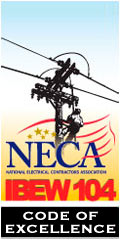Be Safe This Winter, Especially Around Natural Gas
 Print this article | Send to Colleague Print this article | Send to Colleague
The Wakefield Municipal Gas & Light Department is encouraging customers to learn all they can about natural gas, especially now, when the home heating season is in full swing.
Natural gas is used by more than 6,400 residential and commercial customers in the community, according to WMGLD General Manager Pete Dion. While natural gas is very safe when used properly, safety measures should always be in place when using gas appliances, furnaces and heaters.
To stay safe, you should...
- Look for the blue flame on your gas stove. If pilot lights and burners have a steady, blue flame, they are operating correctly. (Decorative gas fire logs are the only exception. Their flame is usually yellow.)
- Have all gas appliances, furnaces, vents, flues, chimneys and gas lines in your home or business inspected every year or two by qualified industry professionals.
- Keep the areas around all appliances and equipment clean and unblocked to allow for proper airflow.
- Follow manufacturer instructions for the care and use of gas appliances and equipment.
- Make sure there is at least one multi-purpose fire extinguisher in your home or place of business.
What you shouldn’t do...
- DON’T let children play with or near natural gas appliances or pipes, even the knobs on the oven or cooktop.
- DON’T use your stove or oven for anything other than cooking. Never use your stove or oven to heat your home under any circumstances.
- DON’T move or install a gas appliance or change the connector in any way without professional assistance.
- DON’T use a space heater UNTIL you are sure it has been vented properly. If using a vent-free heater, make sure the automatic cut-off switch is operational.
- DON’T store household chemicals or combustible materials near gas appliances.
Because natural gas is a colorless, odorless hydrocarbon, a chemical odorant is added making the presence of gas detectable for safety purposes. The odorant has a distinct smell that resembles rotten eggs. If you detect even a small amount of the odor of natural gas in the air, there are several steps you should follow.
If you smell gas in your home:
- Put out all open flames and don’t smoke. Don’t attempt to light any appliances.
- Don't touch electric switches, thermostats, appliance controls or electric panel breakers. These items may cause sparks that could lead to an ignition.
- Do not use an automatic garage door opener.
- Do not start your car if it is in the garage or close proximity to the house.
- Open windows and outside doors for ventilation.
- If the odor is strong, don't use your telephone or cell phone inside the house.
- Leave the premises on foot and call WMGLD at 781-246-6363 from a neighbor's home and remain outside until WMGLD crews arrive. WMGLD provides 24-hour emergency service every day of the year. If you sense an emergency, call 911.
- Do not assume someone else will report the condition.
"It is important to remember that natural gas is very safe when used properly. It is even more important to remember to call 781-246-6363 or 911 if you smell gas. It’s better to be safe than sorry," General Manager Dion concluded.
|
|



